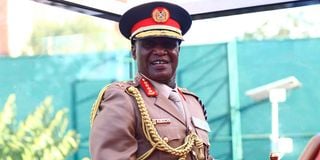Premium
Retired KDF boss reveals why Kenyan soldiers have died in past missions abroad

Former Chief of Kenya Defense Forces General Robert Kibochi at a past event.
What you need to know:
- We are facing situations that are fluid and the decision-making cycle is becoming narrow. We therefore need to act on the intelligence available within the shortest time possible.
- Peace Keeping Training Centres will need to ... align their training programmes with the changing operating environment.
Former Chief of Defence Forces General Robert Kibochi (Rtd) has attributed the loss of lives and equipment in past Kenyan missions to poor intelligence.
Delivering a paper on "Situational Awareness and Peacekeeping Intelligence" at the ongoing International Association of Peacekeeping Training Centres conference in Nairobi, the former KDF boss said critical lessons learnt over the past 10 years have necessitated an improvement in the way Kenya Defence Forces troops and police officers are prepared for deployment.
“We are facing situations that are fluid and the decision-making cycle is becoming narrow. We therefore need to act on the intelligence available within the shortest time possible,” he said.
Prior to deployment, KDF soldiers and accompanying police officers undergo intelligence training that simulates the real-life situation they are likely to encounter on the battlefield as part of their threat assessment.
However, in the field, a lack of cooperation between the host country and the participating troops can create gaps that expose them to great danger, requiring more intelligence gathering to predict what is likely to happen.
“Peace Keeping Training Centres will need to ... align their training programmes with the changing operating environment. We need to also look at how this intelligence is acquired in the field, analysed and disseminated for use knowing the commander needs this information like yesterday to attend to his narrow decision-making window,” he said.
However, Dr Peter Zartsdahl of the East African Standby Force noted that militaries around the world tend to focus on armed actors and contributors rather than the broader indicators of violence.
“They also tend to be less aligned to the transnational (AU/UN and EU) principle that there are police and civilian spheres and tend to be less embedded in the local communities that their missions serve, so in a way you have three people in a car, and the military tends to be in the driver’s seat when they could benefit from listening to the navigator,” he said at the meeting attended by participants from over 67 countries.
Before completing his tour of duty, Kibochi led the KDF’s deployment to Somalia and the Democratic Republic of Congo under the auspices of the United Nations and the East African Community.
Kenya has not witnessed any major attacks on KDF soldiers in their subsequent deployments, but a deadly attack on a KDF forward operating base (FOB) in El Adde, Gedo region, six years ago, left a yet-to–be-disclosed number of soldiers dead, changed the course of history for Kenya's deployments for good.
Al-Shabaab carried out the attack by driving a vehicle-borne implosive device (VBIED) into the entrance of the camp before 5 am, followed by a decoy attack on a makeshift Somali National Army camp opposite the base to divert the soldiers' focus as they entered the camp, leading to hours of heavy fighting with casualties on both sides.
“Attacks that happen in the missions that have terrorist organisations are those that focus on using Improvised Explosive Devices (IEDs), we have tried in our institution to create a regional counter IED capability to be able to prepare these troops effectively because the losses we have incurred on this threat is high,” Kibochi said.
He said part of proper intelligence gathering was to identify the source and genesis of the different types of IEDs.
“We must be very cautious that military intelligence on its own is not adequate, you require to be able to get, for example, political input into this particular realm of intelligence,” he added.





